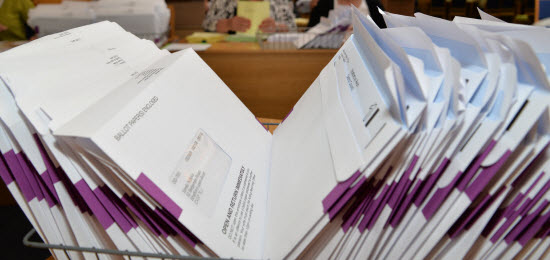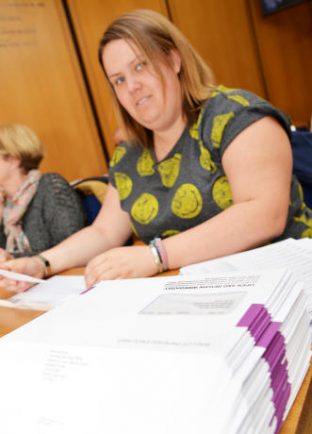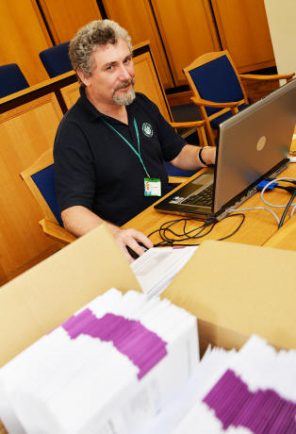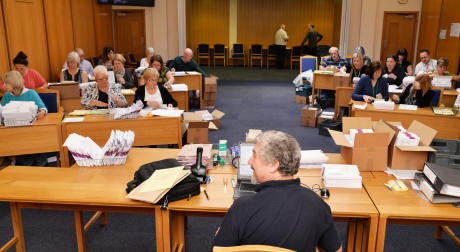STRATFORD District Council is preparing to stage its biggest ever series of elections next week.
Along with the General Election, on Thursday (May 7) the authority will be holding all-out district council elections for the first time, as well as a number of parish council elections.
Keen to see what it takes to put it all together, Observer deputy editor Laura Maltby went to meet some of the key players ahead of the big day.
ELECTIONS are just one day, right? Wrong.
Like many, I turn up on polling day and place my cross. That’s it, job done. Or so I thought.
Never did I stop to consider who the people sitting at the polling station were, how my voting slip made its way there, or where it went afterwards.
It was only when I met Darren Whitney, who has worked for the council’s election team since 1998, that I fully began to understand the scale of the operation.
Organising everything from staff to polling stations, nomination forms to voter registration, Darren and Graham Raspin make up the two-man team who put democracy into action in Stratford.
This year they have been helped out by other members of democratic services, two temporary staff members, and the authority’s chief executive, Paul Lankester.
As Returning Officer, he keeps a watchful eye over the whole process and has regular meetings with Darren – dealing with any problems that may occur – before taking the lead at the election counts.
But if it was hard for me to believe such a small team could be responsible for so much, I was even more surprised to discover planning for this ‘one day’ event actually began last December.
The pair send out letters in January in a bid to assemble their staff and before they know it, it’s April and time to post the notice of election.
Darren admits the biggest challenge is sticking to the tight timescales, which, in recent weeks, has meant working 12-hour shifts including weekends to ensure everything is ready come May 7.
So what’s the highlight?
“When it’s over!” he jokes. “You get an enormous amount of satisfaction from knowing you’ve managed to pull it off and there’s not many jobs where you have that same rush of adrenaline.”
But while Darren is very much looking forward to a well-earned rest, he also appreciates elections simply wouldn’t happen without the commitment and dedication of many others.
This year around 400 paid staff – made up of current, former and retired council workers, as well as volunteers – will take on a number of roles during the election process.
Polling staff generally work from around 6.30am to 10.15pm and although they can take breaks, they can’t leave the premises.
Counting staff meanwhile – many of whom have already been on polling stations all day – clock in at 10pm and work until the count is complete, which can be anywhere between 2am and 5am – provided everything goes to plan.
“Elections are very hectic.” admits Darren. “Making sure no boxes or votes get lost and everything is carried out according to procedure is a huge responsibility and we’re incredibly grateful to everyone who helps – they’re heroes.”
So when the opportunity arose to join the postal vote issuing team for a day, I jumped at the chance to get involved.
The perfect way for people to have their say if they can’t make it to the polling station, this year around 18,000 of the district’s residents will vote by post.
And although the envelope arrives on their doormat, many don’t realise the process it has taken to get there.
Matching up addresses with envelopes, the correct voting slips have to be found and put in the corresponding envelope before being checked, double checked and, in some cases, triple checked.
Having been verified, the envelopes are then sealed, counted into piles of 50 and placed into a box ready to be sent out.
And that is all before they have even left council HQ – with the complex procedure being reversed when votes are returned.
So despite my nerves, under the watchful eye of former council worker Ann and a team of 26, we managed to prepare around 8,700 postal votes – some of which, I was surprised to see, were being sent as far away as America.
This was just one day’s work, though – a very small piece in a much larger election puzzle.
More than 5,500 hours of staffing will go into making May 7 happen in Stratford district and knowing what I do now, I don’t envy Darren, Graham and the team for what they will attempt to pull off.
Up until a month ago, I thought elections were about a single day – but that couldn’t be further from the truth.
The real story lies not only in what goes on that day, but also in what takes place behind the scenes in the run up to bring it all together.
And while I can’t make people vote, it’s fair to say my eyes have been opened by the experience.
So when I mark my ballot paper next week, for the first time ever, I will truly be able to appreciate just how much effort it takes to put on an election.
What has changed for the district council elections this year?
In the past a system of ‘election by thirds’ was used, which meant 18 of the authority’s 53 district councillors went up for election every year for three consecutive years with no election in the fourth year.
But following an electoral review by The Local Government Boundary Commission for England, the number of seats on the council has been slashed from 53 to just 36.
Each ward will now be represented by a single member – where previously there could have been two or three – with elections held once every four years.
More than 150 people have put their hat in the ring to contest the 36 district council seats – 41 of whom are existing councillors looking to either win back their former seat or stand for election in another ward.
Did you know?
– candidates who stand to be an MP do not have to be registered to vote
– being on the electoral register helps with your credit rating
– all the ballot boxes have security seals to ensure no-one can tamper with votes
– each polling station has a presiding officer and a poll clerk who are responsible for overseeing process
– central government allocate a certain amount of money based on how much they think it will cost to stage an election. It is up to the council to claim for anything above and beyond that
– there is no limit to how many people can contest each available seat in an election as long as they fulfill the relevant criteria
– anyone over the age of 16 can help with the election process on polling day as long as they do not have school/college the following day
Election Stat Attack:
– the district council’s election team is made up of just two people – Darren Whitney and Graham Raspin
– around 400 staff come together in a variety of roles – including the returning officer, deputy returning officers, presiding officers, poll clerks, polling station inspecting staff, counting staff – to help make the elections happen
– just under 18,000 postal votes will be issued and returned during this year’s elections
– approximately 91 staff will help count, check and verify all the votes on the Thursday night
– they will count anything between 2,000 and 2,500 votes each over the course of the evening
– there will be around 140 polling stations throughout the district on May 7
– last year’s European elections cost £142,500 to stage and the district council elections, £87,500
A day in the life of a ballot paper:
– it arrives with the presiding officer at the polling station in a book
– it is handed to the elector
– they put their cross on it and place it in the sealed ballot box
– it sits there until close of polls at 10pm then the ballot box is taken by the presiding officer to the count venue
– the box goes into a holding area before all the individual votes are tipped out onto the desk
– it is counted into piles of the same vote (parliamentary/district/parish)
– they are then verified to make sure the number of ballot papers issued at the polling station matches those in the ballot box
– the ballot papers are then split into the different parties and counted
– the winner of that area is announced
– the vote is sealed up again after the count is complete
– it is kept for a year before being destroyed.

















